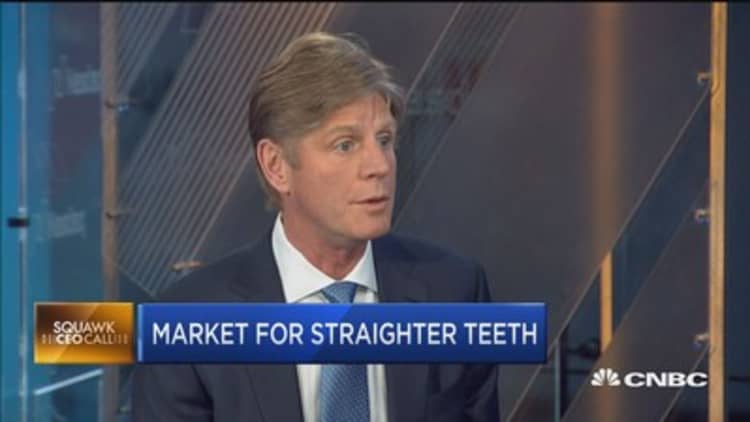It wasn't a big five tech firm, a retailer that accepts bitcoin payments, or a studio releasing a new "Star Wars" movie.
The top-performing stock in the S&P 500 this year was , the company behind Invisalign "clear braces."
Based in San Jose, California, Align has been slowly and steadily replacing metal braces with its removable Invisalign inserts over the years. The clear aligners are custom-made for patients using 3-D imaging software and the company's SmartTrack plastics.
Align's stock price has increased about 125 percent over the past year, opening at $98.71 on Dec. 27, 2016, and at $223.22 on Wednesday.
DataTrek Research co-founder Nick Colas said: "It seems to be the perfect product story for the selfie generation. Who wants crooked teeth in an Instagram post?"

Besides the demand of a selfie-ready generation, what drove investors to Align?
Orthodontists' increasing confidence in the company's technology was a key metric for Jeffrey D. Johnson, a senior research analyst in the medical technology group at Robert W. Baird & Co. He upgraded Align to a buy rating early this year when he noticed orthodontists increasingly chose Invisalign over metal braces.
"We've seen a maturation of Invisalign's clear aligners over the past decade," he said. "They went from a product that was passable for some patients but not good for all back in 2011, to a product that by mid-2016, had orthodontists saying 'I can use this technology in most cases.'"
Johnson's own teenage daughter has begun using Invisalign, he said, and he feels grateful she can remove the dental inserts before her potentially injurious soccer games, or for that matter pizza dinners.
DataTrek's Colas noted that Align's stock got a 10 percent bump when it was added to the Nasdaq 100 in October. "That shows the importance of already strong performers being added to major market indices," he wrote in an email to CNBC.
The company is not without challengers. Align clashed over patents with 3Shape, Clear Correct and Your Smile Direct this year. And recently, some of Align's patents expired.
Start-ups such as Candid and Smile Direct Club have cropped up to compete in the U.S. market as well. They let patients skip the orthodontist visit, sending a "kit" to customers at home, which they can use to make a model of their teeth. Customers send the models back to the companies, and an orthodontist in the back office takes a look to determine if their issues can be addressed with their brand of plastic aligners.
It seems to be the perfect product story for the selfie generation. Who wants crooked teeth in an Instagram post?Nick Colasco-founder, DataTrek Research
By contrast, Invisalign is still sold through orthodontists. As an interesting hedge, Align has taken an equity stake in Smile Direct Club, and supplies the company with some aligners (though not using its strongest resins).
Despite the competition, and its recently expired patents, Baird's Johnson believes that Align is poised for continued growth in 2018.
He said: "There are risks to the stock on concern about competition and sentiment. But we've gotten comfortable with the fact that in the teen population, clear aligners are only used for 3 percent of cases now. In the U.S. their growth is accelerating ... so even if a few competitors are coming to market, Align has advantages like its materials and know-how which put them on the cusp of mass adoption."
So far, Align Technology makes products suitable for teen and adult patients. But the company is working on technology to help children, too, and products to address basically every issue in orthodonture, including extreme situations like underbites that now require corrective surgery.
— CNBC's Evelyn Cheng contributed to this report.


